Basic Attitude and Targets
Recognizing the limits of resources derived from natural capital, we at Nippon Shinyaku are constantly striving to reduce the amounts of resources we use by adopting various methods, including reuse and common use. We are also focusing our effort on the active use of recycled raw materials to ensure that the waste resulting from our activities is recycled or reused. We are working to reduce the quantities of waste generation and waste disposal in landfills, which are general indicators for the abovementioned efforts.
The production of pharmaceuticals and foods necessitates high-quality water. The risk of water shortage in particular could have a major impact on our business continuity. Therefore, we recognize reducing water usage as an important challenge we should tackle.
We also appropriately manage the quality of used water for discharge, including cooling water used at production sites, in compliance with applicable laws and regulations so that water sources will be safeguarded from pollution.
Current Situation and Actual Results
Changes in the amount of waste
As part of its efforts to promote the recycling of resources, Nippon Shinyaku strove to achieve three waste management targets in the three-year period from FY2023 to 2025: (1) reducing the amount of waste for final disposal for FY2025 by 75% from the FY2005 level (14.5 tons); (2) recycling 65% or more of its plastic waste in FY2025; and (3) recycling 60% or more of its waste of all kinds in FY2025.
To effectively use limited resources, we are actively practicing the 3 Rs with waste materials: Reduce, Reuse, and Recycle.
We commission the collection, transportation, and treatment/disposal of waste materials to carefully selected reliable service providers. We use an electronic manifest system to appropriately manage our service providers and periodically inspect them at their facilities so as to ensure responsible waste management.
In the Head Office area in Kyoto and at the Discovery Research Laboratories in Tsukuba, we use an integrated waste management service (ASP service), which realizes operational efficiency and guarantees legal compliance with regard to the release, treatment and disposal, and recycling of waste materials subject to particularly stringent legal restrictions. We ensure to use this service appropriately, with the contents of permits, consignment contracts, and manifests in concordance with one another.
Waste generation
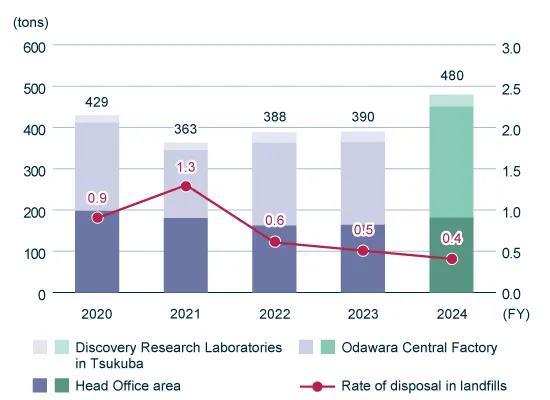
Water consumption
Water consumption in FY2024 was 177 thousand m3. As our 7th Environmental Targets, we are promoting the effective use of water resources by setting a target of reducing unit water consumption by 10% in FY2025 compared to the FY2021 level.
We will continue our efforts to save water with the aim of improving the efficiency of our water use. (Scope: All domestic group companies, excluding sales offices)
Moreover, Nippon Shinyaku was not involved in any cases of finable violations against laws or regulations on drawing or discharging water.
Water consumption
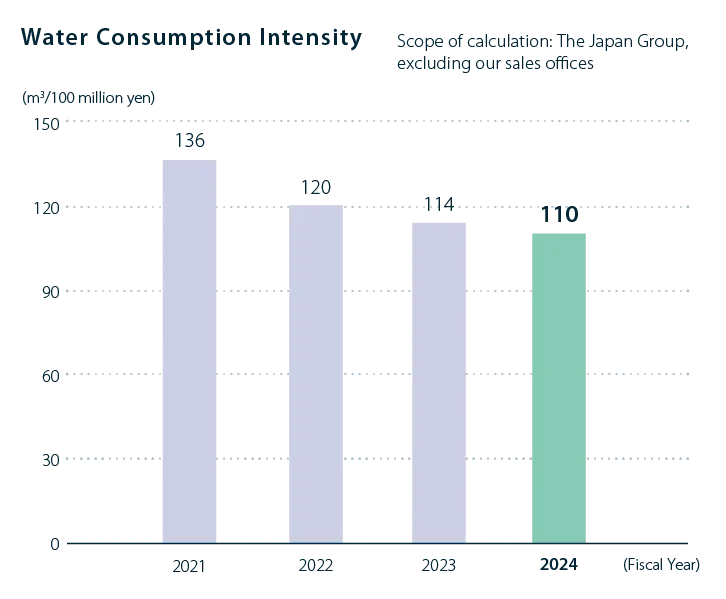
Assessment of water risks and responses thereto
To identify water risks, Nippon Shinyaku has conducted an analysis on its Research and Production Sites of the Nippon Shinyaku Group, using Aqueduct (4.0),* a set of water risk assessment tools provided by the World Resources Institute (WRI), a global environmental research institute.
The analysis has revealed that the Odawara Central Factory and Discovery Research Laboratories in Tsukuba are located in areas with medium-high water risks, but that no Nippon Shinyaku business locations are located in areas with high or extremely high water risks.
* A set of water risk assessment tools developed and presented by the World Resources Institute (WRI)
Aqueduct | World Resources Institute (wri.org)
Water stress assessment using WRI Aqueduct (4.0) (FY2021–FY2024)
Units : 1,000 m3
| Water stress level | Business location name | FY2021 | FY2022 | FY2023 | FY2024 |
|---|---|---|---|---|---|
| Water withdrawal | Water withdrawal | Water withdrawal | Water withdrawal | ||
| Low (<10%) | None | - | - | - | - |
| Low - Medium (10 - 20%) | Head Office area (Kyoto) | 30 | 25 | 24 | 33 |
| Sioe Pharmaceutical Co., Ltd. | 5 | 5 | 5 | 5 | |
| Tajima Shokuhin Kogyo Co., Ltd. | 24 | 19 | 20 | 23 | |
| Medium - High (20 - 40%) | Odawara Central Factory | 133 | 138 | 127 | 113 |
| Discovery Research Laboratories in Tsukuba | 1 | 1 | 1 | 2 | |
| High (40 - 80%) | None | - | - | - | - |
| Extremely High (>80%) | None | - | - | - | - |
| Total | 194 | 189 | 178 | 177 | |
Major Initiatives
Appropriate treatment and utilization of waste materials
We appropriately treat and manage waste materials, recycle metals, and collect and sort out plastic waste, all in compliance with the Waste Disposal and Public Cleansing Act and applicable ordinances imposed by the local governments of respective Nippon Shinyaku business locations.
In the Head Office area and at the Discovery Research Laboratories in Tsukuba, we have adopted an integrated waste management system (based on application service provider [ASP] services) that is capable of appropriately and continuously supporting waste management. This enables us to confirm responsible waste treatment and disposal by our service providers. Furthermore, in the Head Office area, we disclose information regarding waste materials from time to time on the in-house intranet based on the KES Environmental Management System Standard.
Introduction of packaging materials thatreduce environmental impact
We are working to reduce environmental impact through packaging of pharmaceutical products.
We will continue striving to realize a sustainable recycling-oriented society through both environmentally conscious packaging design and resource recycling.
Use of biomass materials
We use plant-derived biomass plastic for protective materials for vial breakage-resistant packaging.
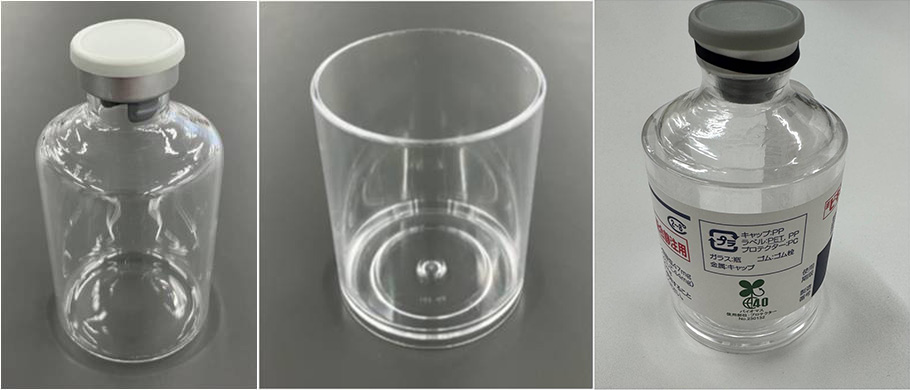
Adoption of boxes with integrated cushioning
For packaging fragile injectable products, we use boxes with integrated cushioning, instead of plastic cushioning materials.
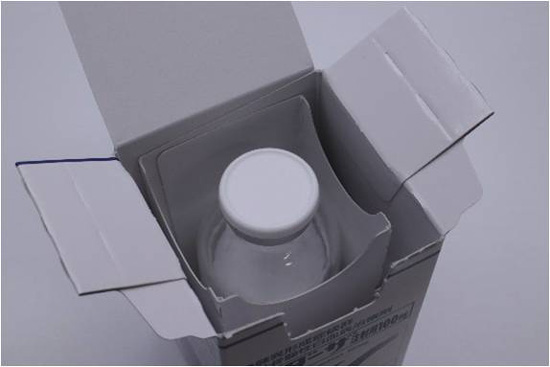
Horizontal recycling of label backing paper
We are participating in a resource recycling project that aims to replace label backing paper (release paper) with “recyclable backing paper.” Through this project, we contribute to reducing combustible waste and lowering CO₂ emissions.
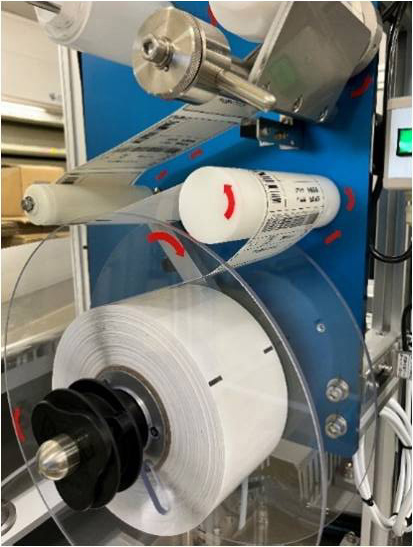
Individual packaging boxes: Use of paper resources with consideration for environmental conservation
For paperboard used for individual packaging boxes, we utilize resources sourced from managed forests. By supporting environmentally conscious sustainable forest management, we contribute to the preservation of the global environment.
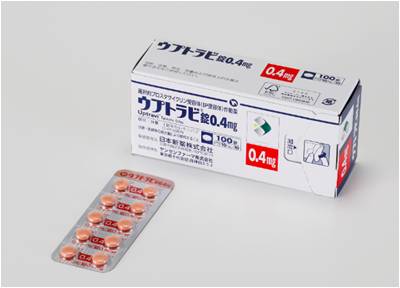
Plastics Smart Campaign - a 1.2-ton reduction of PET bottle use
Endorsing its objective of reducing marine plastic litter, Nippon Shinyaku has joined the Plastics Smart campaign launched by the Ministry of the Environment of Japan. In the Blue Smile Project, the plastic waste reduction initiative that Nippon Shinyaku has registered within a Kyoto City-initiated campaign, all employees are provided with their own multiple-use bottles and encouraged to use them in the workplace, while on assignment away from the workplace, and even in their free time. Moreover, the suspension of the sale of drinks in PET bottles from vending machines in the Head Office area resulted in a drop of waste PET bottles from 1.2 tons in FY 2019 to zero. This achievement drew great attention and praise from society, and Nippon Shinyaku was featured on the Kyoto City-operated website “Kogomi Net,” dedicated to waste reduction and recycling information, as a company proactively engaged in plastic waste reduction.
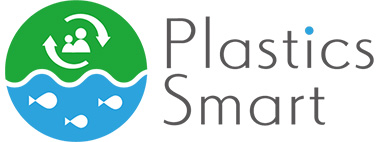
Please refer to the following web pages for further details (Japanese only).
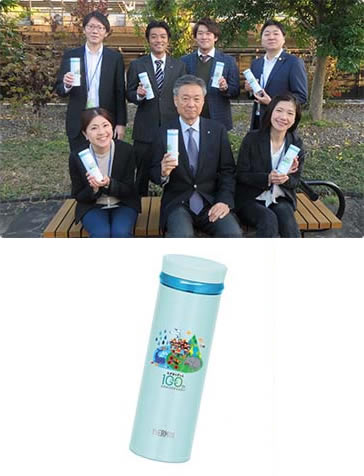
Appreciation by External Parties
Recognized as an especially excellent business operator in Kyoto City’s certification system for special excellence in "2R" practices
To further reduce waste, Kyoto City inaugurated in FY 2017 a system to certify business operators that implement remarkably creative, proactive or otherwise especially outstanding "2R" (waste reduction and reuse) practices. Our Head Office area (Kyoto) has been certified by Kyoto City as an especially excellent business operator in 2R practices, mainly in recognition of the company’s support for the Plastics Smart Campaign and the registration of the company's Blue Smile Project for the campaign.







